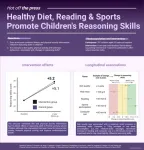(Press-News.org) SPOKANE, Wash. – New animal research suggests that little-studied brain cells known as astrocytes are major players in controlling sleep need and may someday help humans go without sleep for longer without negative consequences such as mental fatigue and impaired physical health.
Published in the Journal of Neuroscience, the study found that activating these cells kept mice awake for hours when they would normally be resting, without making them any sleepier.
“Extended wakefulness normally increases sleep time and intensity, but what we saw in this study was that despite hours of added wakefulness these mice did not differ from well-rested controls in terms of how long and how intensely they slept,” said senior author Marcos Frank, a neuroscientist and professor at the Washington State University Elson S. Floyd College of Medicine. “This opens up the possibility that we might someday have interventions that could target astrocytes to mitigate the negative consequences of prolonged wakefulness.”
Frank envisioned that might include medications that could be used to improve the productivity, safety and health of shift workers and others who work long or odd hours, such as first responders and military personnel. Sleep loss and mistimed sleep have been shown to impact a variety of key processes, including attention, cognition, learning, memory, metabolism and immune function.
Astrocytes are types of non-neuronal cells that interact with neurons, brain cells that transmit easily measured electrical signals from the brain to other parts of the body. Previously thought of as merely the “glue” that holds the brain together, astrocytes have recently been shown to play an active role in various behaviors and processes through a much more subtle and difficult-to-measure process known as calcium signaling. This includes a previous WSU study that showed that suppressing astrocyte calcium signaling throughout the brain resulted in mice building up less sleep need after sleep deprivation.
In this study, the researchers looked specifically at astrocytes in the basal forebrain, a brain region known to play a critical role in determining time spent asleep and awake as well as sleep need. Using chemogenetics—a method to control and study signaling pathways within brain cells—they activated these astrocytes and found that this resulted in mice staying awake for 6 hours or more during their normal sleep period. What’s more, the researchers did not see subsequent changes in sleep time or sleep intensity in response to the added wakefulness, as would be expected.
“Our findings suggest that our need for sleep isn’t just a function of prior wake time but is also driven by these long-ignored non-neuronal cells,” said first author Ashley Ingiosi, an assistant professor of neuroscience at Ohio State University who conducted the study while working as a postdoctoral research associate in Frank’s lab at WSU. “We can now start to pinpoint how astrocytes interact with neurons to trigger this response and how they drive the expression and regulation of sleep in different parts of the brain.”
Next, the researchers plan to conduct behavioral tests in mice to determine how activating basal forebrain astrocytes to induce wakefulness might impact other processes besides sleep need, such as attention, cognition, learning, memory, metabolism and immune function. To get at least some indication of the potential impact on attention and cognition, they looked at EEG markers of those two processes in this study and found them to be similar to those seen in well-rested controls.
Funding support for the study came from the National Institutes of Health.
END
Lesser-known brain cells may be key to staying awake without cost to cognition, health
2023-08-17
ELSE PRESS RELEASES FROM THIS DATE:
Endocrine Society honors endocrinology field’s leaders with 2024 Laureate Awards
2023-08-17
WASHINGTON—The Endocrine Society today announced it has chosen 14 leading endocrinologists as winners of its prestigious 2024 Laureate Awards, the top honors in the field.
Endocrinologists are scientists and medical doctors who specialize in unravelling the mysteries of hormone disorders to care for patients and cure diseases. These professionals have achieved breakthroughs in scientific discoveries and clinical care benefiting people with hundreds of conditions, including diabetes, thyroid disorders, obesity, hormone-related cancers, growth problems, osteoporosis and infertility.
Established in 1944, the Society’s Laureate ...
Without aggressive climate action, U.S. property values will take a hit from escalating wildfire risk and tree mortality, study finds
2023-08-17
Earth’s rapidly changing climate is taking an increasingly heavy toll on landscapes around the world in the form of floods, rising sea levels, extreme weather, drought and wildfire.
Also at growing risk are the values of property where these hazards are projected to worsen, according to a new study by University of Utah scholars. The research team, led by biology professor William Anderegg, attempted, for the first time, to quantify the value of U.S. property at risk in forested areas exposed ...
Bigger and better quantum computers possible with new ion trap, dubbed the Enchilada
2023-08-17
ALBUQUERQUE, N.M. — Sandia National Laboratories has produced its first lot of a new world-class ion trap, a central component for certain quantum computers. The new device, dubbed the Enchilada Trap, enables scientists to build more powerful machines to advance the experimental but potentially revolutionary field of quantum computing.
In addition to traps operated at Sandia, several traps will be used at Duke University for performing quantum algorithms. Duke and Sandia are research partners through the Quantum Systems Accelerator, one of five U.S. National Quantum Information Science Research Centers funded by the Department of Energy’s ...
Is data justice the key to climate justice?
2023-08-17
Bias in the collection of data on which Artificial Intelligence (AI) computer programmes depend can limit the usefulness of this rapidly growing tool for climate scientists predicting future scenarios and guiding global action, according to a new paper by researchers at the University of Cambridge published in Nature’s npj |Climate Action series.
AI computer programmes used for climate science are trained to trawl through complex datasets looking for patterns and insightful information. However, missing information from certain locations on the planet, time periods or societal dynamics create “holes” ...
AI model developed by Brigham researchers could help screen for heart defect
2023-08-17
The AI model was more efficient at detecting signatures of atrial septal defect (ASD) in electrocardiograms (ECG) than traditional methods.
Investigators from Brigham and Women’s Hospital, a founding member of the Mass General Brigham healthcare system, and Keio University in Japan have developed a deep learning artificial intelligence model to screen electrocardiogram (ECG) for signs of atrial septal defects (ASD). This condition can cause heart failure and is underreported due to a lack of symptoms before irreversible complications arise. Their results are published in eClinicalMedicine.
"If we can deploy our model on a population-level ECG screening, ...
Child Development Journal Q&A: How do youth view gang violence is shaping their communities?
2023-08-17
How do children and adolescents evaluate and reason about acts of physical violence in the context of chronic violence that impacts their communities? Previous studies have used situations that correspond with a single act of interpersonal harm void of broader conditions of violence shaping the context in question. A new study released in Child Development examined how youth exposed to gangs known as maras (e.g., MS 13) in Honduras morally deliberate about conditions of gang violence compared with youth not exposed to gangs in Nicaragua, where there are very few maras ...
Can children recognize sick faces?
2023-08-17
According to the World Health Organization, globally, infectious disease is a leading cause of death among children. Furthermore, children are more likely than adults to contract infectious illnesses. However, there’s a gap in research measuring children’s responses to sick faces. It is important to understand how children’s ability to recognize and avoid sickness emerges and develops to help improve children’s health and public health more broadly. Previous research has only reported that adults can use faces to recognize if someone is sick and make judgments about whether to approach or avoid them.
Researchers from the University ...
Lorazepam treatment may be linked to worse outcomes for pancreatic cancer patients
2023-08-17
PHILADELPHIA – Patients with pancreatic cancer who took the benzodiazepine lorazepam (Ativan), commonly prescribed to treat anxiety during cancer treatment, had a shorter progression-free survival than patients who did not, according to results published in Clinical Cancer Research, a journal of the American Association for Cancer Research (AACR).
In contrast, patients who took the benzodiazepine alprazolam (Xanax) had a significantly longer progression-free survival than patients who did not.
Benzodiazepines are a class of drugs that suppress the activity of the central nervous system, which can relieve ...
A healthy diet, reading, and doing sports promote reasoning skills in children
2023-08-17
Reasoning skills are crucial skills in learning, academic performance, and everyday problem-solving. According to a recent study conducted at the University of Eastern Finland, improved overall diet quality and reduced consumption of red meat, as well as increased time spent in reading and organised sports enhanced reasoning skills among children over the first two school years.
“Children with healthier eating habits showed greater cognitive development than other children. Specifically, better overall diet quality, ...
Heredity and environment account for people’s love of nature
2023-08-17
Humans have a positive view of nature. But is this due to an approach we have learned while growing up, or is it something we are born with? The answer is ‘Both’, according to researchers at the University of Gothenburg and the Swedish University of Agricultural Sciences.
Our love of nature is highly individual and should influence how we plan our cities, say the researchers.
It is well known that nature has a positive effect on people. In cities in particular, studies have shown that trees and other greenery contribute to people’s wellbeing. However, experts do not agree on the reasons behind this phenomenon, known ...



